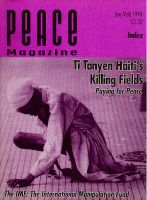
Peace Magazine Jan-Feb 1994, page 23. Some rights reserved.
Search for other articles by Dietrich Fischer here
Similarities between Hitler and Zhirinovsky and the conditions which brought them to power are considered
There are many disturbing parallels between Hitler and Vladimir V.Zhirinovsky, whose (il)liberal (un)democratic party made worrisome gains in Russia's parliamentary elections. He is openly racist. He has made territorial claims on all of the former Soviet Union, even Finland, parts of Poland and Alaska, demanding compensation from the United States for Alaskan minerals. His autobiography "The Last Push to the South," in which he proposes "The conquest of Afghanistan, Iran and Turkey...in search of warm-water ports" recalls Hitler's Mein Kampf. Both threatened a military build up. His skillful use of television resembles Hitler's demagogic rhetoric on radio. Most significantly, both won a large and fantastic following because of a sense of national humiliation and economic desperation.
During the 1919 peace talks at Versailles, John Maynard Keynes, a British delegate, warned that the imposition of huge reparations payments on Germany would contribute to social unrest and a desire for revenge. When his advice was ignored, he resigned in protest. As it turned out, the German people's resentment against the Versailles treaty made it easy for Hitler to campaign on a promise to abrogate it. After World War II, the United States avoided that mistake. Through the Marshall Plan, it helped its former enemies Germany and Japan, turning them into allies.
When Iran seized American hostages, some Americans carried bumper stickers "Nuke the Ayatollah." A sense of frustration helped Reagan win the 1980 U.S. presidential election by promising a huge military buildup to make the United States feared and respected again. That humiliation was nothing compared to what the Soviet Union suffered with the collapse of its empire and the drop in living standards. We should not be surprised that similar rhetoric appeals to Russian voters.
Ever since 1985, when Gorbachev sought an end to the cold war, the Soviet Union has received little cooperation from the West and a long series of snubs. During his first month in office, Gorbachev stopped deploying medium range nuclear missiles, but Reagan continued. In August 1985, Gorbachev initiated an 18-month unilateral nuclear test moratorium and invited the United States to join, but Reagan refused. Gorbachev's plea to send an observer delegation to the GATT talks was rejected. When he offered to help launch American satellites after the Challenger disaster, Reagan accused him of trying to steal U.S. technology. In the talks on conventional force reductions in Europe, the Soviet Union, in a weak position, had to yield to U.S. demands that it destroy ten times as many tanks as the United States. When Moscow wanted to buy a modern fiberoptics telephone network in the West, the Reagan and Bush administrations refused, saying that would make spying on the Soviet Union harder. How could the Soviet Union build a market economy without a functioning telephone network?
In July 1991, Gorbachev came to the G-7 summit in London to plead for an urgent loan, warning of an impending coup otherwise, but was sent back empty-handed. One month later the coup came. It failed and gave the West a second chance to be more cooperative, but that chance may soon slip away.
On Western advice, President Yeltsin lifted price controls, imposing hardship on his people, but instead of economic help, he has mainly received more lectures from the International Monetary Fund on how Russia should conduct its affairs.
The United States spent trillions on defence against the Soviet Union and had a detailed plan on how to destroy it in case of a nuclear war, but no plan whatsoever on how to help it shift to democracy and a market economy if it wanted to.
What can be done to avoid a militaristic, expansionist Russia and possibly World War III? Let us learn the bitter lessons of Versailles. The Russian people must soon feel that economic reforms are improving their lives, not making them worse. President Yeltsin should be invited as a full participant to the next G-7 meeting (making it G-8). That would cost little, but would let the Russian people feel treated with respect.
Because of the world recession, most governments are reluctant to give Russia financial assistance. But material help can actually create jobs in East and West. Why should the United States continue to build nuclear submarines simply to keep workers employed? The same workers cold produce computers, optic fibers, food processing and transportation equipment that Russia needs desperately to increase its supply of consumer goods, and to create jobs for its people. Economic cooperation is mutually beneficial, as the members of the European community discovered long ago.
Exchanges of students can build friendship and disseminate new ideas. It is no coincidence that Alexander Yakovlev, the key architect of perestroika, was one of the first Russianstudents in the U.S. in 1956-57.
Of course, the main responsibility for Russia's fate lies with the Russians. But the rest of the world can do much to help Russia's path to democracy. A fascist regime in Russia would endanger the whole world. Every effort is needed to prevent that.
In an address to the U.S. Congress in February 1990, Vaclav Havel said, "You can help us most of all if you help the Soviet Union on its...immensely complicated road to democracy.... The millions you give to the East today will soon return to you in the form of billions in savings." It's late to heed this advice, but perhaps not too late.
Dietrich Fischer, a professor at Pace University and board member of Economists Allied for Arms Reduction, is the author of Nonmilitary Aspects of Security.

Peace Magazine Jan-Feb 1994, page 23. Some rights reserved.
Search for other articles by Dietrich Fischer here